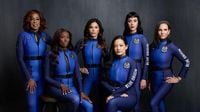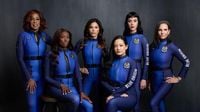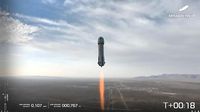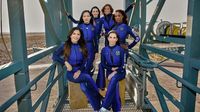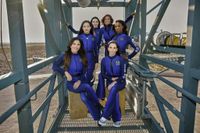In a historic milestone for space travel, Blue Origin's all-female crew, featuring pop superstar Katy Perry, successfully completed their mission on Monday, April 14, 2025. This flight, known as NS-31, marks the first all-female spaceflight since 1963, when Soviet cosmonaut Valentina Tereshkova made her groundbreaking journey into orbit.
The launch took place at 9:30 a.m. ET from Blue Origin's Launch Site One in Van Horn, Texas, where the New Shepard rocket lifted off on schedule. The flight lasted a little over 10 minutes, during which the crew experienced a brief period of weightlessness as the rocket soared more than 62 miles above Earth, crossing the Kármán line, the recognized boundary of space.
Alongside Perry, the crew comprised notable figures including journalist Gayle King, Lauren Sánchez (who is also the fiancée of Blue Origin's founder Jeff Bezos), former NASA rocket scientist Aisha Bowe, civil rights activist Amanda Nguyen, and filmmaker Kerianne Flynn. This diverse group of women not only made history but also showcased the evolving role of women in aerospace.
“I’ve dreamt of going to space for 15 years and tomorrow that dream becomes a reality,” Perry expressed on social media just a day before the launch. Her excitement was palpable as she, along with her fellow crew members, prepared for the journey that would place them among the elite group of individuals who have ventured into space.
Upon landing, Bezos was on hand to greet the crew as they exited the capsule, with Sánchez being the first to step out, followed closely by Perry, who famously kissed the ground in exhilaration. King shared a heartfelt sentiment about the experience, stating, “Now that I’ve done it, I really do feel that I can take on anything.”
The significance of this mission extends beyond just the thrill of space travel; it highlights the contributions and achievements of women in fields traditionally dominated by men. The crew is part of a broader narrative that seeks to inspire future generations of women to pursue careers in science, technology, engineering, and mathematics (STEM).
Despite the celebratory atmosphere, the mission has not been without controversy. Critics, including actress Olivia Munn, have voiced concerns regarding the extravagant nature of the flight, questioning its purpose in the broader context of space exploration and societal issues. Munn remarked, “Space exploration was to further our knowledge and to help mankind. What are they gonna do up there that has made it better for us down here?”
In response to the mixed reactions, Amanda Nguyen emphasized the scientific aspects of their journey, noting that she is conducting experiments in space to gather data on plant growth and astronaut suit functionality. “Women, in the beginning of NASA, were barred from becoming astronauts, and one of the reasons cited was menstruation, but they didn’t have the data to back that up,” she explained. Nguyen's research aims to provide valuable insights that could influence future missions.
The New Shepard rocket, named after Alan Shepard, the first American in space, operates autonomously, allowing it to carry up to six passengers without the need for trained pilots. This particular flight was the 11th crewed mission for Blue Origin and the 31st overall launch of the New Shepard rocket since its inception in 2021.
Blue Origin's commitment to making space accessible to civilians has been evident since its first crewed flight, which included Bezos himself. Since then, the company has transported a total of 52 people to the edge of space, paving the way for a new era of commercial space tourism.
The launch received extensive media coverage, with various outlets providing live broadcasts of the event. CBS, for instance, aired a special segment titled “Gayle Goes to Space,” highlighting the journey of King and her fellow astronauts. The excitement surrounding the launch was palpable, not just among the crew but also among their friends and family, including celebrities like Oprah Winfrey, who attended the event in person.
As the crew returned to Earth, they became part of a significant moment in history, not only for their individual achievements but also for what they represent in the ongoing fight for gender equality in science and technology. Their journey serves as a reminder that women can and do belong in every field, including those that reach for the stars.
While the mission has sparked discussions about the commercialization of space and the responsibilities that come with it, the all-female crew's successful flight is a testament to the advancements being made in aerospace. As they reflect on their experience, the crew members hope to inspire others to dream big and pursue their passions, no matter the obstacles.
This flight stands as a beacon of progress, and as the world watches, it’s clear that the future of space exploration is bright, especially with women at the forefront.
